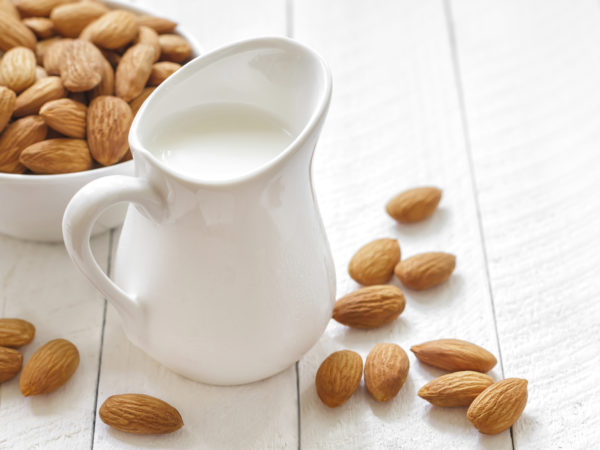How Healthy Is Almond Milk?
What can you tell me about almond milk? Do you consider it a healthy alternative to soy milk or cow’s milk? If not, what do you regard as the best option?
Andrew Weil, M.D. | March 14, 2013

Almond milk is becoming increasingly popular as a reasonable alternative to cow’s milk or soy milk. However, almond milk doesn’t provide enough protein to be direct substitute for those products. That doesn’t mean you shouldn’t use it, but if you do, be sure that you get adequate protein from other sources.
If you’re trying to get away from cow’s milk, I usually recommend switching to soy milk. It is widely available and provides more protein than other “milks” on the market. It also has a creamy texture, but you need to be aware that some brands contain additives and thickeners, including carrageenan, which should be avoided. If you are allergic to soy or dislike soy milk, almond milk is a good choice as long as you pay attention to your protein intake.
Commercially available almond milk is often enriched with vitamins A and D, as well as calcium, to make it seem more like regular milk. (Almonds provide some calcium, but not as much as cow’s milk.) Almond milk is low in calories compared to other milk substitutes and contains some heart-healthy monounsaturated fat.
Be sure to check the labels of almond milk before you buy, because some brands contain preservatives, and other additives. Note that you can make almond milk at home – an easy process, requiring only organic raw almonds, water and a little sugar or other sweetener. You can find many recipes online.
You might also try oat, hemp or rice milk. Oat milk provides more fiber than other milk substitutes and was shown in a Swedish study to help lower LDL (“bad”) cholesterol and total cholesterol.
Hemp milk, made by pulverizing the seeds, blending them with water and straining out the solid residue, provides both omega-6 and omega-3 essential fatty acids in a healthy three-to-one ratio. Other nutrients in hemp milk include magnesium, phytosterols, ascorbic acid, beta-carotene, calcium, fiber, iron, potassium, phosphorus, riboflavin, niacin and thiamin. The milk also contains 10 essential amino acids, making it a decent vegetarian source of protein. Hemp seeds and nuts are not allergens, so the milk is a safe option for those allergic to tree nuts or soy.
Rice milk is my least favorite dairy substitute because it offers few nutritional benefits unless it is fortified. It also typically contains many additives to improve its texture. I recommend it only to those with soy, gluten or tree-nut allergies or sensitivities who cannot tolerate cow’s milk.
Andrew Weil, M.D.










